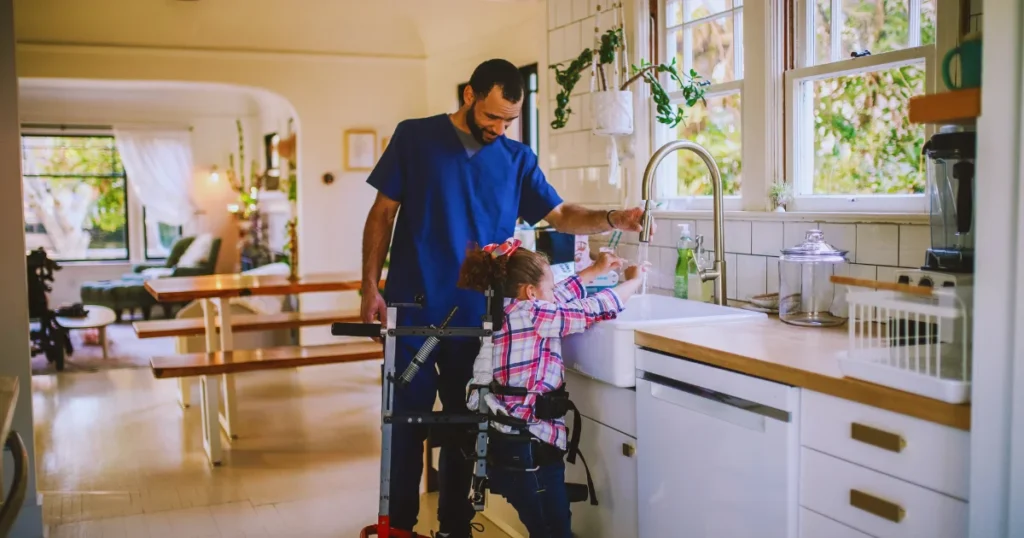Choosing the right care home can be confusing with all different types of care homes available.
Options include residential care for daily support, assisted living for more independence, and specialist care homes for conditions like dementia, etc.
Fear not, we’re here to help your family find the right fit with ease.
Table of Contents
What is a Care Home?
A care home is a place where individuals who find it difficult to live on their own can receive the support they need.
These homes provide help with everyday tasks like bathing, dressing, and preparing meals, offering a safe and supportive environment.

Additionally, many elderly care homes offer special care for patients with dementia, physical disabilities, or complicated medical conditions.
What Care Homes Provide
- Comfortable accommodation with assistance for daily tasks.
- Help with dressing, taking medication, and other personal needs.
- Opportunities for social activities and interactions.
The Role of the Care Quality Commission (CQC)
In the UK, the CQC makes sure care homes meet important standards for safety and quality. They regularly
- inspect homes,
- rate them on effectiveness and care quality, and
- publish these reports for the public.
Families can use these reports to assess a home and make well-informed decisions.
Types of Care Services
- Basic care to assist with daily living.
- Specialist support for individuals with conditions like dementia or physical disabilities.
By understanding what is a care home and using resources like CQC reports, families can find the right fit. Whether it’s residential care homes for the elderly or nursing homes with specialist care, these facilities offer a warm and welcoming environment.
Types of Care Facilities: Services, Ideal Residents, and Day-to-Day Life
| Care Home Type | Services Provided | Ideal Residents | Example of Day-to-Day Life |
| Residential Care Homes (for elderly) | 1. Help with daily tasks like bathing and dressing. 2. Nutritious meals are served in communal dining areas. 3. Housekeeping and social activities. | 1. Elderly or disabled individuals who need light daily assistance without medical care. | 1. Morning personal care, a group yoga session, lunch, crafts in the afternoon, and socialising or relaxing in the evening. |
| Nursing Homes | 1. Includes all residential services. 2. 24/7 medical support. 3. Specialized treatments like wound care or physiotherapy. | 1. Individuals with chronic illnesses or those needing regular medical attention. | 1. Nurse-assisted morning care, a physiotherapy session, shared lunch,light exercises, and evening health monitoring. |
| Dementia Care Homes | 1. Secure environments with locked doors, memory aids, and sensory programs. 2. Structured routines to support emotional stability. | 1. Individuals with dementia or Alzheimer’s who need specialised care. | 1. Memory board activities, sensory programs, secure garden walks, and calm evening routines. |
| Dual-Registered Care Homes | Combines residential and nursing care for flexible and evolving needs.Comprehensive support for varying care levels. | 1. Residents with changing care needs or couples needing different levels of care. | 1. Yoga or crafts for some, nursing care for others, communal meals, and shared evening activities. |
| Palliative Care Homes / Hospice | 1. End-of-life care focused on comfort, dignity, and emotional support. 2. Pain management and support for families. | 1. Individuals with terminal illnesses needing 24/7 compassionate care. | 1. Morning pain management, Family visits, Soothing activities, and serene evenings in a peaceful setting. |
Alternatives to Nursing Home Care
Supported Living for Adults

Supported living is all about helping individuals stay independent while offering a little extra help where needed. People can live in their own homes or shared spaces, managing their routines with support to make life easier.
- Who is it for?
- Adults with mild to moderate disabilities who want to live independently but need help with specific tasks.
- Services Provided:
- Help with cooking, cleaning, and managing bills.
- Assistance accessing healthcare and community resources.
- Emotional support to build confidence and self-reliance.
Adult Day Care Centres
Adult daycare facilities offer a safe and social space during the day for individuals who need support while their family members are at work or need a break.
These centres are a great way to meet people, enjoy activities, and get a little extra care.
- Who is it for?
- Seniors or adults with disabilities who live at home but need extra daytime support.
- Individuals looking for social interaction and structured activities.
- Services Provided:
- Fun group activities like crafts, games, and discussions.
- Healthy meals and light health monitoring.
- Gentle exercises like chair yoga or walking clubs.
Extra Care Housing
Extra care housing gives people the best of both worlds—independent living with the added benefit of support when needed. Residents live in their own self-contained homes but have access to services like meals, personal care, and social spaces.
- Who is it for?
- Older adults or those with limited mobility who want independence with some extra help.
- Services Provided:
- Help with personal care tasks such as bathing or dressing.
- Emergency alarm systems are available 24/7.
- Communal spaces like gardens and lounges for socialising.
- Regular social events and activities.
Retirement Villages
Retirement villages are communities designed for seniors who want to live independently but enjoy the perks of shared facilities. Residents can decorate their own homes, keep pets, and access care services whenever needed.
- Who is it for?
- Active seniors who value independence while being part of a supportive community.
- Services Provided:
- Customisable homes with features like fall alarms and accessible showers.
- Care services available on-site when needed.
- Communal spaces and social activities to stay connected.
Home Care (Domiciliary Care)
Home care allows individuals to stay in the comfort of their own home while receiving support. It’s flexible, ranging from short visits for small tasks to 24-hour care for those who need it.
- Who is it for?
- People who need help with daily activities but want to remain at home.
- Services Provided:
- Help with personal care like washing, dressing, and getting in and out of bed.
- Assistance with cooking, shopping, and household chores.
- Companionship and support for outings like doctor visits.
Mental Health Hospitals
Mental health hospitals provide a safe, supportive environment for individuals dealing with complex mental health needs. With a professional staff and tailored care plans, these facilities help residents on their path to recovery.
- Who is it for?
- Adults requiring mental health support or recovery services.
- Services Provided:
- Rehabilitation and life skills programs.
- Safe facilities, including private rooms and communal spaces.
- Therapeutic activities to aid recovery and build independence.
Comparison of Care Home Types
| Feature | Residential Care Homes | Nursing Homes | Dementia Care Homes | Dual-Registered Care Homes |
| Personal Care Assistance | Yes | Yes | Yes | Yes |
| 24-Hour Nursing Care | No | Yes | Often | Yes |
| Specialized Dementia Support | No | No | Yes | Yes |
| Suitable for Evolving Needs | No | No | No | Yes |
Key Considerations When Choosing a Care Home
Assessing Care Needs
- Identify the level of care needed, from personal assistance to 24-hour medical attention.
- Homes specializing in dementia or complex medical needs might be better for specific conditions.
- A professional needs assessment can help determine suitable care options.
Location and Proximity
- Select a care home close to family and friends to maintain regular visits.
- Consider proximity to parks, community centres, or familiar places to improve well-being.
- Check for nearby healthcare facilities for emergencies or ongoing treatments.
- Look for care homes near your location for convenience.
Quality of Care
- Review the Care Quality Commission (CQC) ratings for safety, staff quality, and care standards.
- Visit the home to observe staff interactions, cleanliness, and overall environment.
- Check if the care home offers personalized care plans and engaging activities.
- Look up CQC reports to compare care homes effectively.
Example Checklist for Moving into a Care Home
You can follow the below-mentioned checklist for moving into a care home:
| Consideration | Details |
| Care Needs Assessment | Determine the level of care required for daily and medical needs. |
| Financial Planning | Understand the costs involved and explore available funding options. |
| Location | Choose a care home conveniently located for family visits and local amenities. |
| Quality of Care | Review CQC reports, observe staff interactions, and assess the care home’s environment. |
| Personal Preferences | Consider the resident’s preferences, such as room type, activities, and available facilities. |
Financial Considerations
Average Cost of Care Homes in the UK
The cost of care homes in the UK varies depending on location, care type, and facilities provided. On average:
- Residential care homes: £700–£900 per week.
- Nursing homes: £900–£1,500 per week due to medical care.
The following factors can also influence the prices:
- staff qualifications,
- amenities,
- and specialized services, like dementia care.
Additional charges may include
- activities,
- personal care items, or
- therapy sessions.
Researching care homes in your area and requesting detailed fee breakdowns can help you plan effectively. Learn more about affordable elderly care options.
The 7-Year Rule for Care Home Fees
The 7-Year Rule is linked to inheritance tax and property ownership. It means that if someone gives away assets, like a house, to avoid care home fees, they need to live for at least seven years after the transfer.
If they don’t, the value of the gift may still be subject to inheritance tax.
This rule is in place to prevent financial misuse and to create a fair care funding process.
Families who need help covering care home costs can look into options like deferred payment agreements or government-funded care programs if they qualify.
Speaking with a financial advisor or reaching out to your local authority can help clear up any confusion about how the rule works. By understanding these financial details, families can make better choices when planning for care home expenses.
Have more questions about adult care homes? Find helpful answers in our FAQ section.
Why Choose Metro Care UK?
Metro Care UK stands out for its compassionate and personal approach. We work with families to design support plans for each resident. We have:
- Modern, homely facilities equipped for comfort and safety.
- Engaging in activities that promote well-being and social connection.
- Positive testimonials from families who trust our care.
Our community’s goal is to provide residents with a fulfilling lifestyle and a sense of belonging. For more information or to schedule a visit, contact us today. Choose Metro Care UK as your trusted partner for care.
Conclusion
Choosing the right care home is an important decision based on individual needs, location, cost, and quality. Metro Care UK offers various types of care, including residential care, nursing support, and specialist services for dementia and learning disabilities.
We provide compassionate, personalised support to help your loved one feel safe and valued. If you are looking for types of care homes near London, contact us. Let us guide you in finding the right care option for your family.
Frequently Asked Questions
What’s the difference between a nursing home and a care home?
A nursing home provides 24-hour medical care by registered nurses for residents with complex health needs. A care home offers personal care, like help with dressing, bathing, and meals, but no medical treatment.
What is the difference between extra care and residential care?
Extra care allows individuals to live independently in their apartments with access to support services, like meal preparation or personal care. Residential care offers accommodation and round-the-clock personal care within a shared setting, ideal for those needing more hands-on support.
How many types of care homes are there?
There are four main types of care homes:
1. Residential care homes for personal support.
2. Nursing homes for medical care.
3. Dementia care homes for specialised support.
4. Dual-registered homes combining residential and nursing care.
What is the 7-year rule for care home fees?
The 7-year rule applies to inheritance tax. If a person gives away assets, like a house, and lives for at least seven years after the transfer, the asset is exempt from inheritance tax. However, this rule doesn’t exempt the person from paying care home fees.
What is the average cost of a care home per week in the UK?
The average weekly cost is:
1. Residential care homes: £700–£900.
2. Nursing homes: £900–£1,500.
Costs vary based on location, facilities, and level of care needed. Families should research funding options for affordability.

